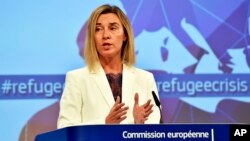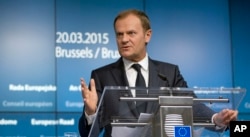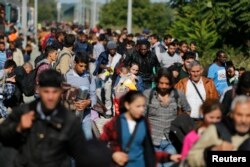The European Union's Mediterranean naval operation is entering the second phase of an operation against migrant traffickers, begining October 7.
Speaking at the Rome headquarters of the EU operation, or EUNAVFOR MED, on Thursday, the bloc’s foreign affairs chief Federica Mogherini announced the decision, saying that “the assets are ready."
Explaining the new phase, Mogherini said that European warships will operate against traffickers - namely would search and, if necessary, divert suspicious vessels - only in international waters and will not enter into Libyan territory.
The three-phase operation, launched at the end of June, includes the use of military force against migrant traffickers, the seizure of vessels used to transport people across the Mediterranean Sea, most of them departing from the coast of Libya, as well as disposal of vessels and related assets, preferably before use, and also the apprehension of traffickers and smugglers.
The EU operation currently has four ships and several planes at its disposal.
Meanwhile, German Chancellor Angela Merkel said that Europe's agreement on a quota plan to accommodate 120,000 migrants is a sign of unity, but cautioned that it is only a first step.
She said in a meeting in Berlin Thursday that Europe is still "very far" from where it needs to be in dealing with the situation. She said the violence in Syria that caused the displacement of so many people can only be resolved with help from the United States, Russia, and the Middle East.
On Wednesday, European Union leaders agreed to give $1.1 billion to international aid agencies helping refugees at camps near their home countries.
The European Council President Donald Tusk made the announcement after an emergency summit in Brussels ended early Thursday.
He said the leaders from the 28 EU countries agreed on increased aid to countries like Lebanon, Jordan and Turkey which are hosting millions of refugees from war-torn Syria.
The leaders also agreed to set up "hotspots'' by the end of November where EU experts can quickly register and identify people eligible for refugee protection, Tusk said.







